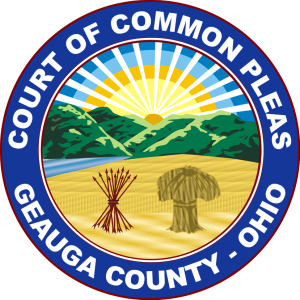What are the Juror Terms of Service?
Each juror is usually scheduled for only a one or two-week period. Jurors for individual cases are randomly selected from the jurors in their group. Therefore, even if you are instructed to come to Court, you may not be selected to serve. You should know by 11:00 A.M. the first day of trial if you are selected to serve as a juror.
How long do trials last?
Trials generally last two to three days; however, a trial may last longer. On the first day of trial, you will be advised by the Judge of the anticipated duration of the case. The hours for jury trials are normally 8:30 A.M. to 4:30 P.M.
How was I selected for jury duty?
In Geauga County, jurors are randomly selected from a list of registered voters in Geauga County and drivers licenses.
How much advance notice will I receive when I’m scheduled for jury duty?
If you have not already received a summons and report date along with eResponse instructions, you may be assigned a report date with two weeks advance notice.
What is the dress code?
While there is no strict dress code, we request you please wear clothing that is appropriate in a court of law and reflects the seriousness of your duty as a juror. We recommend comfortable, casual business attire. Because the temperature in the Courtroom fluctuates, we suggest bringing a sweater or a jacket as an extra layer. Hats are not permitted inside the Courtroom.
What can I bring into the Courthouse?
All purses, packages, or backpacks should be left in your vehicle. If brought, you will be asked to return the item to your car or it may be temporarily confiscated by security and given back to you at the end of the day.
Are meals provided?
The Court is unable to provide meals for jurors. However, you will be given an hour for lunch to go to one of the local restaurants, and you may bring your own lunch. There are multiple dining options within walking distance from the Courthouse in Chardon square. You are not permitted to eat in the Courtroom.
Will I be sitting in trial for the entire day?
No, you will not be in the Courtroom for the entire day. You will be given breaks and time to eat lunch during the trial. There may also be a waiting period before the trial begins, so we recommend bringing a book, your phone, or some form of entertainment to help pass the time.
Is the Courthouse handicap accessible?
Handicapped parking spaces are located on the south side of the Courthouse. Please call in advance so we can assist you further.
What if I moved and do not live in Geauga County anymore?
You must live in Geauga County to serve as a juror for the Geauga County Court of Common Pleas. If you moved outside of the county and still received a jury summons, you are excused from jury duty. Please correct your residence address on the questionnaire and return it to the Court, so we may update our records.
Will I be compensated?
You will be paid $25.00 a day for your service as a juror. You will be paid via check a few weeks from your last day of service.
Where do I park as a juror?
Jurors are permitted to park in the Geauga County parking lot located on the east side of the Chardon Square, across the street from the Courthouse (on East Park Street, near Park Auditorium). Jurors may also park around the town square or on Short Court Street, which bisects the square. You should prominently display your Juror Notice on the dashboard of your vehicle to avoid a parking ticket.
What security measures are in place?
For your safety, a sheriff is located at the entrance. Everyone will pass through a metal detector. All purses, packages, or backpacks should be left in your vehicle. Please do not bring weapons, pepper spray, knives, or sharp objects, as they will be confiscated. Any legal, confiscated item will be returned to you as you leave the Courthouse at the end of the day.
Will I get any proof of attendance as a juror?
Upon request, the Court can give you a letter to verify your service.
What is the difference between Grand Jury and Petit Jury?
There are two types of jurors in Ohio: petit and grand jurors. Your jury summons will indicate whether you were chosen for petit or grand jury service. While petit jurors decide a defendant’s guilt or innocence, grand jurors decide whether or not there is sufficient evidence to bring felony charges against a person who allegedly committed a crime (the defendant). There are nine jurors on a grand jury and five alternate grand jurors. Seven must vote in favor of indictment in order to charge the defendant. Grand juries begin every felony case, so your service as a grand juror is vital to the legal system. Grand Jury service is very different than petit jury service. Generally, your session will convene on Friday mornings for several hours, depending on how many cases the Prosecutor’s Office needs to present. Once the Grand Jury is selected and sworn in, the Geauga County Prosecutor controls the sessions. Further details will be provided on the afternoon of the impaneling session. The Supreme Court of Ohio created this video to provide more information about grand juries: http://www.ohiochannel.org/video/grand-jury-duty-in-ohio

